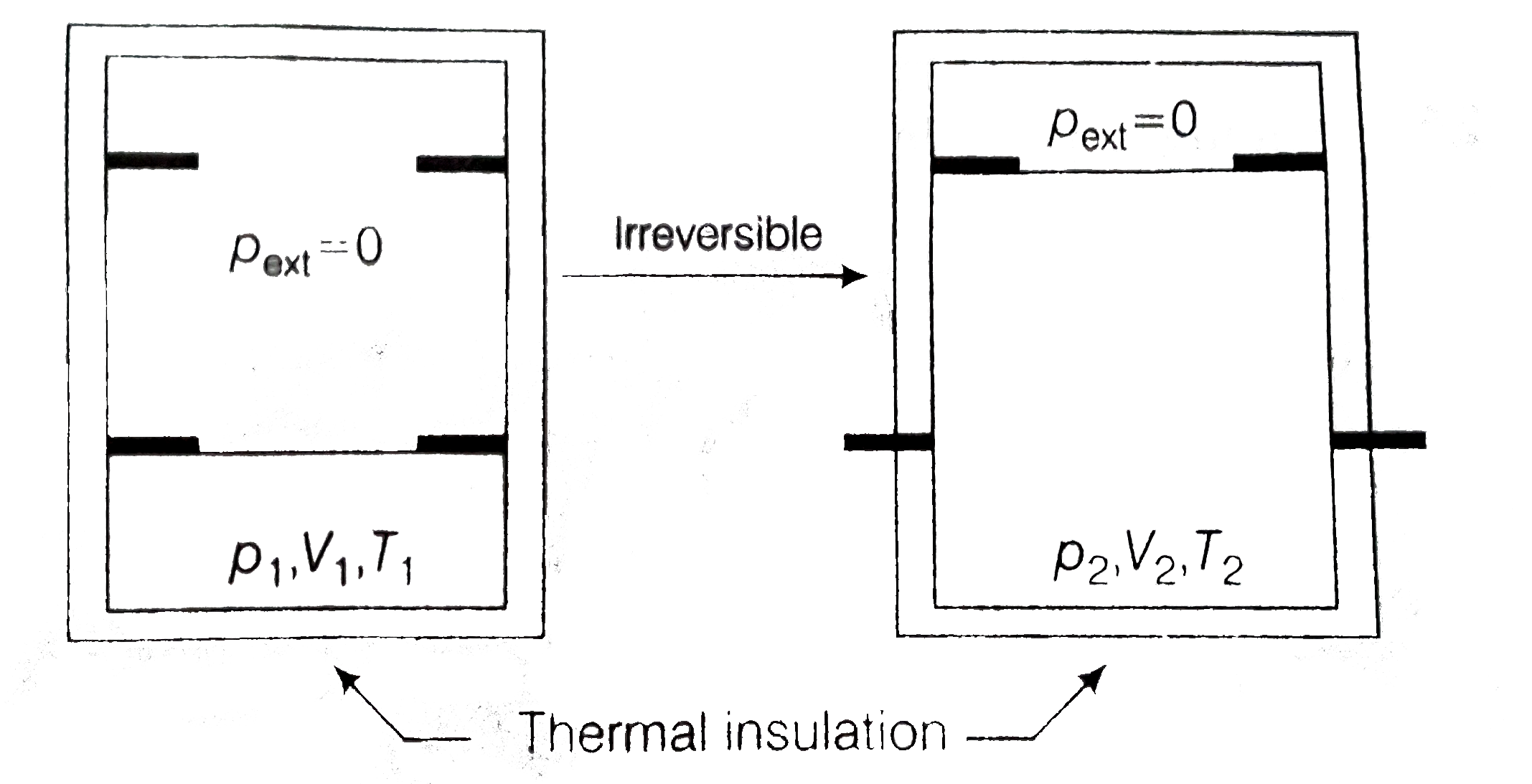Thermal coefficient of volume expansion at constant pressure for an ideal gas sample of n moles having pressure P0, volume V0, and temperature T0 is
RP0V0
P0V0R
1T0
1nT0
The correct Answer is:C
PV=nRT
PdV=nRdT
γ=1VdVdT and dVdT=nRP⋅γ=1T
For given temperature T0γ=1T0.
Topper's Solved these Questions
- THERMAL PROPERTIES OF MATTERBOOK - A2ZCHAPTER - THERMAL PROPERTIES OF MATTEREXERCISE - Calorimetry
41 Videos
- THERMAL PROPERTIES OF MATTERBOOK - A2ZCHAPTER - THERMAL PROPERTIES OF MATTEREXERCISE - Transmission Of Heat : Conduction
28 Videos
- ROTATIONAL DYNAMICSBOOK - A2ZCHAPTER - ROTATIONAL DYNAMICSEXERCISE - Chapter Test
29 Videos
- UNIT, DIMENSION AND ERROR ANALYSISBOOK - A2ZCHAPTER - UNIT, DIMENSION AND ERROR ANALYSISEXERCISE - Chapter Test
28 Videos
Similar Questions
Knowledge Check
A mixture of ideal gas containing 5 moles of monatomic gas and 1 mole of rigid diatomic gas is initially at pressure P0 volume V0 and temperature T0. If the gas mixture is adiabatically compressed to a volume V0/4, then the correct statement(s) is(are) : (Given R is gas constant)
AAdiabatic constant of the gas mixture is 1.6BThe work |W| down during the process is 12RT0CThe average kinetic energy of the gas mixture after compression is in between 18RT0 and 19RT0DThe final pressure of the gas mixture after compression is in between 9P0 and 10P0Ten moles of a diatomic perfect gas are allowed to expand at constant pressure. The initial volume and temperature are V0 and T0 respectively. If 72RT0 heat is transferred to the gas, then the final volume and temperature are
A(a) 1.1V0,1.1T0B(b) 0.9V0,0.9T0C(c) 1.1V0,1011T0D(d) 0.9V0,109T0One mole of a monatomic ideal gas has an initial pressure, volume, and temperature of P0,V0, and 438 K, respectively. It undergoes an isothermal expansion that triples the volume of the gas. Then, the gas undergoes an isobaric compression back to its original volume. Finally, the gas undergoes an isochoric increase in pressure, so that the final pressure, volume, and temperature are p0V0 and 438 K, respectively. Find the total heat for this three-step process, and state whether it is absorbed by or given off by the gas.
A3640J absorbedB−1820 J given offC1570 J , absorbedD−1110J , given off
A container of volume V1 has an ideal gas of molar mass M1 at pressure P1 and temperature T1. Another container of volume V2 has another ideal gas of molar mass M2 at pres- sure P2 and temperature T2. Two gases are mixed in a vessel and acquire an equilibrium temperature and pressure of T0 and P0 respectively. Find the density of the mixture.
View SolutionAn ideal gas has a specific heat at constant pressure Cp=5R2. The gas is kept in a closed vessel of volume V0 at temperature T0 and pressure p0. An amount fo 10p0V0 of heat is supplied to the gas.
(a) Calculate the final pressure and temperature of the gas.
(b) Show the process on p-V diagram.
View SolutionDraw the P-T and V-T diagrams of an isochoric process of n moles an ideal gas from pressure P0 volume V0 to pressure 4P0, indicating the pressures and temperatures of the gas in the initial and the final states.
View SolutionA gas is undergoing an adiabatic process. At a certain stage, the volume and absolute temperature of the gas are V0,T0 and the magnitude of the slope of the V-T curve is m. molar specific heat of the gas at constant pressure is [Assume the volume of the gas is taken on the y-axis and absolute temperature of the gas taken on x-axis]
View SolutionAn ideal gas in thermally insulated vessel at internal (pressure)=P1,(volume)=V1 and absolute temperature=T1 expands irreversiby against zero external, pressure , as shown in the diagram,
The final internal pressure, volume and absolute temperature of the gas are p2,V2andT2, respectively . For this expansion

View Solution
